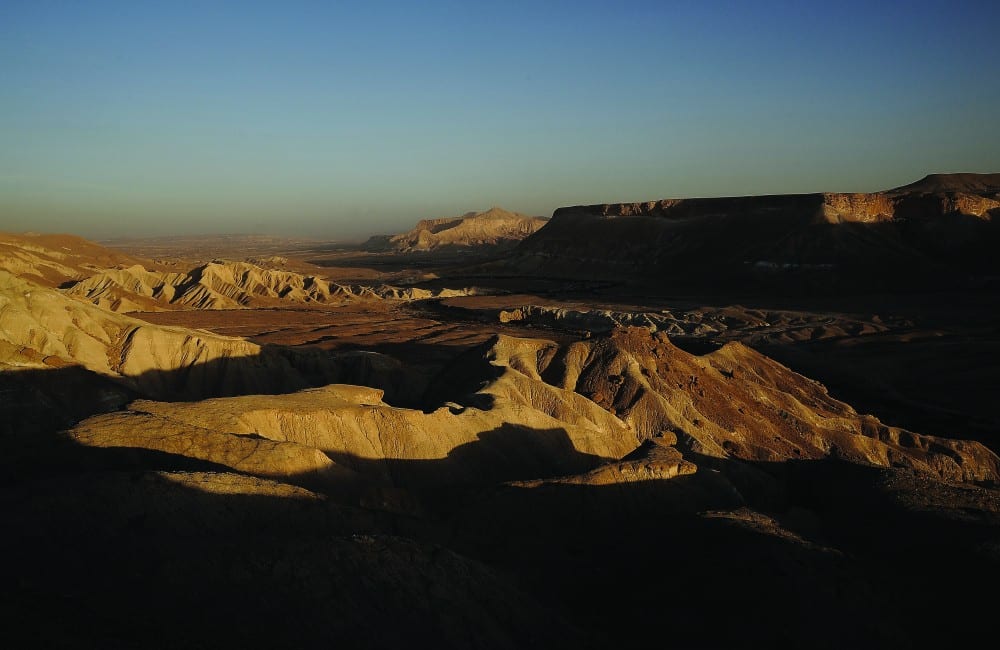
TORAH
NEVI'IM
KETUVIM
Chapter 6
Translation and Transliteration of
Listen to this chapter in Hebrew:
- Commentary
- Buy E-book
- Buy the Israel Bible
1Hashem spoke to Moshe, saying:
אוַיְדַבֵּר יְהֹוָה אֶל־מֹשֶׁה לֵּאמֹר׃
2Speak to the Israelites and say to them: If anyone, man or woman, explicitly utters a nazirite's vow, to set himself apart for Hashem,
בדַּבֵּר אֶל־בְּנֵי יִשְׂרָאֵל וְאָמַרְתָּ אֲלֵהֶם אִישׁ אוֹ־אִשָּׁה כִּי יַפְלִא לִנְדֹּר נֶדֶר נָזִיר לְהַזִּיר לַיהֹוָה׃
3he shall abstain from wine and any other intoxicant; he shall not drink vinegar of wine or of any other intoxicant, neither shall he drink anything in which grapes have been steeped, nor eat grapes fresh or dried.
גמִיַּיִן וְשֵׁכָר יַזִּיר חֹמֶץ יַיִן וְחֹמֶץ שֵׁכָר לֹא יִשְׁתֶּה וְכָל־מִשְׁרַת עֲנָבִים לֹא יִשְׁתֶּה וַעֲנָבִים לַחִים וִיבֵשִׁים לֹא יֹאכֵל׃
4Throughout his term as nazirite, he may not eat anything that is obtained from the grapevine, even seeds or skin.
דכֹּל יְמֵי נִזְרוֹ מִכֹּל אֲשֶׁר יֵעָשֶׂה מִגֶּפֶן הַיַּיִן מֵחַרְצַנִּים וְעַד־זָג לֹא יֹאכֵל׃
5Throughout the term of his vow as nazirite, no razor shall touch his head; it shall remain consecrated until the completion of his term as nazirite of Hashem, the hair of his head being left to grow untrimmed.
הכָּל־יְמֵי נֶדֶר נִזְרוֹ תַּעַר לֹא־יַעֲבֹר עַל־רֹאשׁוֹ עַד־מְלֹאת הַיָּמִם אֲשֶׁר־יַזִּיר לַיהֹוָה קָדֹשׁ יִהְיֶה גַּדֵּל פֶּרַע שְׂעַר רֹאשׁוֹ׃
6Throughout the term that he has set apart for Hashem, he shall not go in where there is a dead person.
וכָּל־יְמֵי הַזִּירוֹ לַיהֹוָה עַל־נֶפֶשׁ מֵת לֹא יָבֹא׃
7Even if his father or mother, or his brother or sister should die, he must not defile himself for them, since hair set apart for his God is upon his head:
זלְאָבִיו וּלְאִמּוֹ לְאָחִיו וּלְאַחֹתוֹ לֹא־יִטַּמָּא לָהֶם בְּמֹתָם כִּי נֵזֶר אֱלֹהָיו עַל־רֹאשׁוֹ׃
8throughout his term as nazirite he is consecrated to Hashem.
חכֹּל יְמֵי נִזְרוֹ קָדֹשׁ הוּא לַיהֹוָה׃
9If a person dies suddenly near him, defiling his consecrated hair, he shall shave his head on the day he becomes clean; he shall shave it on the seventh day.
טוְכִי־יָמוּת מֵת עָלָיו בְּפֶתַע פִּתְאֹם וְטִמֵּא רֹאשׁ נִזְרוֹ וְגִלַּח רֹאשׁוֹ בְּיוֹם טָהֳרָתוֹ בַּיּוֹם הַשְּׁבִיעִי יְגַלְּחֶנּוּ׃
10On the eighth day he shall bring two turtledoves or two pigeons to the Kohen, at the entrance of the Tent of Meeting.
יוּבַיּוֹם הַשְּׁמִינִי יָבִא שְׁתֵּי תֹרִים אוֹ שְׁנֵי בְּנֵי יוֹנָה אֶל־הַכֹּהֵן אֶל־פֶּתַח אֹהֶל מוֹעֵד׃
11The Kohen shall offer one as a sin offering and the other as a burnt offering, and make expiation on his behalf for the guilt that he incurred through the corpse. That same day he shall reconsecrate his head
יאוְעָשָׂה הַכֹּהֵן אֶחָד לְחַטָּאת וְאֶחָד לְעֹלָה וְכִפֶּר עָלָיו מֵאֲשֶׁר חָטָא עַל־הַנָּפֶשׁ וְקִדַּשׁ אֶת־רֹאשׁוֹ בַּיּוֹם הַהוּא׃
12and rededicate to Hashem his term as nazirite; and he shall bring a lamb in its first year as a penalty offering. The previous period shall be void, since his consecrated hair was defiled.
יבוְהִזִּיר לַיהֹוָה אֶת־יְמֵי נִזְרוֹ וְהֵבִיא כֶּבֶשׂ בֶּן־שְׁנָתוֹ לְאָשָׁם וְהַיָּמִים הָרִאשֹׁנִים יִפְּלוּ כִּי טָמֵא נִזְרוֹ׃
13This is the ritual for the nazirite: On the day that his term as nazirite is completed, he shall be brought to the entrance of the Tent of Meeting.
יגוְזֹאת תּוֹרַת הַנָּזִיר בְּיוֹם מְלֹאת יְמֵי נִזְרוֹ יָבִיא אֹתוֹ אֶל־פֶּתַח אֹהֶל מוֹעֵד׃
14As his offering to Hashem he shall present: one male lamb in its first year, without blemish, for a burnt offering; one ewe lamb in its first year, without blemish, for a sin offering; one ram without blemish for an offering of well-being;
v'-hik-REEV et kor-ba-NO la-a-do-NAI KE-ves ben sh'-na-TO ta-MEEM e-KHAD l'-o-LAH v'-khav-SAH a-KHAT bat sh'-na-TAH t'-mee-MAH l'-kha-TAT v'-a-yil e-KHAD ta-MEEM lish-la-MEEM
ידוְהִקְרִיב אֶת־קָרְבָּנוֹ לַיהֹוָה כֶּבֶשׂ בֶּן־שְׁנָתוֹ תָמִים אֶחָד לְעֹלָה וְכַבְשָׂה אַחַת בַּת־שְׁנָתָהּ תְּמִימָה לְחַטָּאת וְאַיִל־אֶחָד תָּמִים לִשְׁלָמִים׃
![]() 6:14 For a sin offering
6:14 For a sin offering
The nazirite is someone who takes it upon himself to abstain from wine, from cutting his hair and from contracting spiritual impurity from a dead body. He accepts these voluntary restrictions for the purpose of coming closer to Hashem and elevating himself spiritually. In essence, a nazirite removes himself from the ills of society so that he can remain pure and holy. At first glance, this seems admirable, something to be lauded and emulated. Indeed, the verse refers to the nazirite as “consecrated to Hashem” (verse 8). However, at the completion of his period of abstinence, the nazirite is required to bring a sin-offering. What is his sin? The Talmud (Taanit 11a) explains that while it is important to set aside time to work on oneself and one’s personal growth, the ideal is not to remove oneself from society completely. Rather, we must try to elevate ourselves within society and bring the rest of the world up with us.
15a basket of unleavened cakes of choice flour with oil mixed in, and unleavened wafers spread with oil; and the proper meal offerings and libations.
טווְסַל מַצּוֹת סֹלֶת חַלֹּת בְּלוּלֹת בַּשֶּׁמֶן וּרְקִיקֵי מַצּוֹת מְשֻׁחִים בַּשָּׁמֶן וּמִנְחָתָם וְנִסְכֵּיהֶם׃
16The Kohen shall present them before Hashem and offer the sin offering and the burnt offering.
טזוְהִקְרִיב הַכֹּהֵן לִפְנֵי יְהֹוָה וְעָשָׂה אֶת־חַטָּאתוֹ וְאֶת־עֹלָתוֹ׃
17He shall offer the ram as a sacrifice of well-being to Hashem, together with the basket of unleavened cakes; the Kohen shall also offer the meal offerings and the libations.
יזוְאֶת־הָאַיִל יַעֲשֶׂה זֶבַח שְׁלָמִים לַיהֹוָה עַל סַל הַמַּצּוֹת וְעָשָׂה הַכֹּהֵן אֶת־מִנְחָתוֹ וְאֶת־נִסְכּוֹ׃
18The nazirite shall then shave his consecrated hair, at the entrance of the Tent of Meeting, and take the locks of his consecrated hair and put them on the fire that is under the sacrifice of well-being.
יחוְגִלַּח הַנָּזִיר פֶּתַח אֹהֶל מוֹעֵד אֶת־רֹאשׁ נִזְרוֹ וְלָקַח אֶת־שְׂעַר רֹאשׁ נִזְרוֹ וְנָתַן עַל־הָאֵשׁ אֲשֶׁר־תַּחַת זֶבַח הַשְּׁלָמִים׃
19The Kohen shall take the shoulder of the ram when it has been boiled, one unleavened cake from the basket, and one unleavened wafer, and place them on the hands of the nazirite after he has shaved his consecrated hair.
יטוְלָקַח הַכֹּהֵן אֶת־הַזְּרֹעַ בְּשֵׁלָה מִן־הָאַיִל וְחַלַּת מַצָּה אַחַת מִן־הַסַּל וּרְקִיק מַצָּה אֶחָד וְנָתַן עַל־כַּפֵּי הַנָּזִיר אַחַר הִתְגַּלְּחוֹ אֶת־נִזְרוֹ׃
20The Kohen shall elevate them as an elevation offering before Hashem; and this shall be a sacred donation for the Kohen, in addition to the breast of the elevation offering and the thigh of gift offering. After that the nazirite may drink wine.
כוְהֵנִיף אוֹתָם הַכֹּהֵן תְּנוּפָה לִפְנֵי יְהֹוָה קֹדֶשׁ הוּא לַכֹּהֵן עַל חֲזֵה הַתְּנוּפָה וְעַל שׁוֹק הַתְּרוּמָה וְאַחַר יִשְׁתֶּה הַנָּזִיר יָיִן׃
21Such is the obligation of a nazirite; except that he who vows an offering to God of what he can afford, beyond his nazirite requirements, must do exactly according to the vow that he has made beyond his obligation as a nazirite.
כאזֹאת תּוֹרַת הַנָּזִיר אֲשֶׁר יִדֹּר קָרְבָּנוֹ לַיהֹוָה עַל־נִזְרוֹ מִלְּבַד אֲשֶׁר־תַּשִּׂיג יָדוֹ כְּפִי נִדְרוֹ אֲשֶׁר יִדֹּר כֵּן יַעֲשֶׂה עַל תּוֹרַת נִזְרוֹ׃
22Hashem spoke to Moshe:
כבוַיְדַבֵּר יְהֹוָה אֶל־מֹשֶׁה לֵּאמֹר׃
23Speak to Aharon and his sons: Thus shall you bless the people of Yisrael. Say to them:
da-BAYR el ah-ha-RON v'-el ba-NAV lay-MOR KOH t'-va-r'-KHU et b'-NAY yis-ra-AYL a-MOR la-HEM
כגדַּבֵּר אֶל־אַהֲרֹן וְאֶל־בָּנָיו לֵאמֹר כֹּה תְבָרֲכוּ אֶת־בְּנֵי יִשְׂרָאֵל אָמוֹר לָהֶם׃
24Hashem bless you and protect you!
y'-va-re-kh'-KHA a-do-NAI v'-yish-m'-RE-kha
כדיְבָרֶכְךָ יְהֹוָה וְיִשְׁמְרֶךָ׃
25Hashem deal kindly and graciously with you!
ya-AYR a-do-NAI pa-NAV ay-LE-kha vee-khu-NE-ka
כהיָאֵר יְהֹוָה פָּנָיו אֵלֶיךָ וִיחֻנֶּךָּ׃
26Hashem bestow His favor upon you and grant you peace!
yi-SA a-do-NAI pa-NAV ay-LE-kha v'-ya-SAYM l'-KHA sha-LOM
כויִשָּׂא יְהֹוָה פָּנָיו אֵלֶיךָ וְיָשֵׂם לְךָ שָׁלוֹם׃
![]() 6:26 Bestow His favor upon you and grant you peace
6:26 Bestow His favor upon you and grant you peace
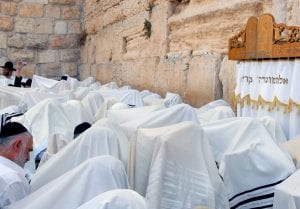
The Priestly Blessing at the Western Wall
The Priestly Blessing uttered by the Kohanim contains three parts. It begins with a blessing for prosperity and safety, continues with a blessing for Hashem’s grace, and climaxes with a blessing of peace. Indeed, the Sages of the Mishna (Oktzin 3:12) taught that “God found no vessel to contain His blessings, other than peace.” In Israel, the Priestly Blessing is recited publicly each day by individuals possessing a family tradition that they are among the descendants of Aharon, a group whose lineage has been verified in recent years by DNA testing. We pray every day for the total fulfillment of the Priestly Blessing, when the Jewish people will live peacefully in Eretz Yisrael.
27Thus they shall link My name with the people of Yisrael, and I will bless them.
כזוְשָׂמוּ אֶת־שְׁמִי עַל־בְּנֵי יִשְׂרָאֵל וַאֲנִי אֲבָרֲכֵם׃


What Samson and a Modern-Day Nazirite Have to do with Redemption

What is the Key to Avoiding Political Hatred and Jealousy?
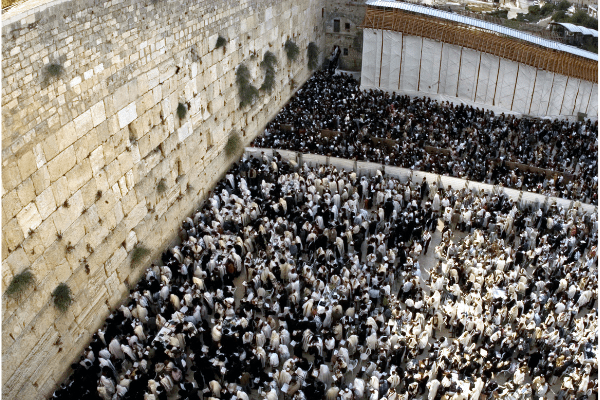
How a Biblical Blessing can Change the Lives of your Children and Grandchildren

The Nazirite: Saint or Sinner?
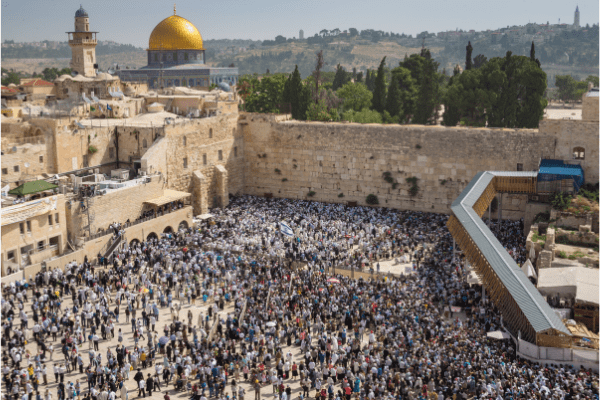
The Priestly Blessing on the Intermediate Days of Passover
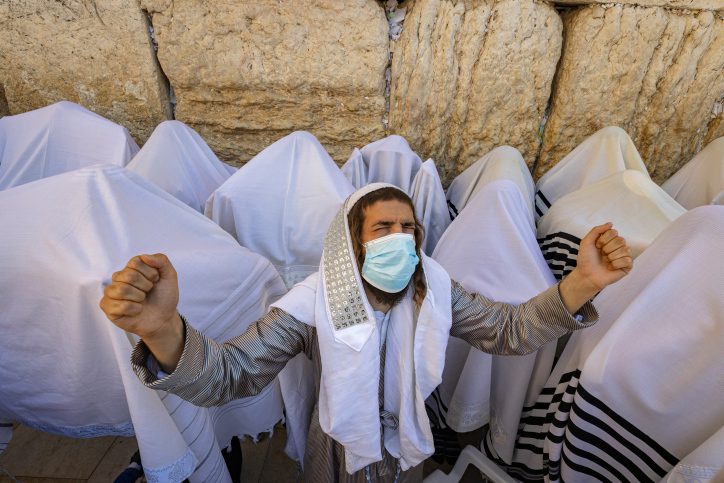
Experience Sukkot’s Priestly Blessing

What is the Birkat Kohanim? The Jewish Priestly Blessing





